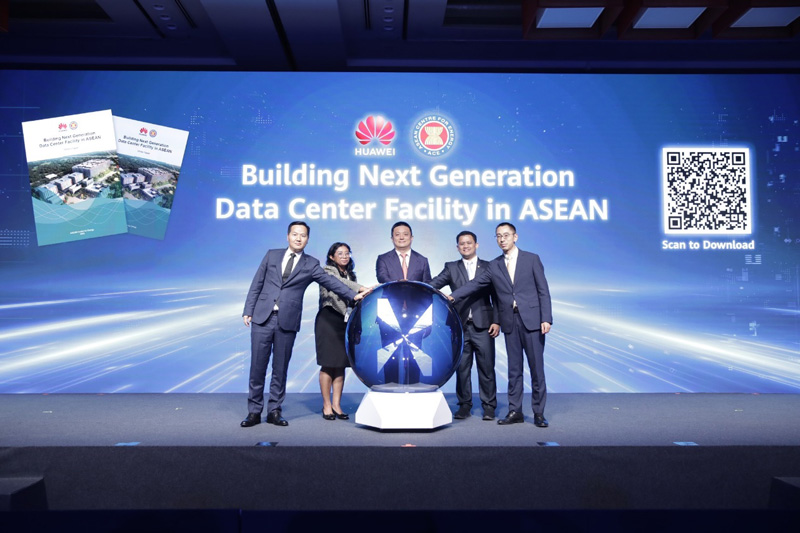On May 17, 2024, at the 2024 Global Data Center Industry Forum, the “ASEAN Next-Generation Data Center Construction White Paper” (hereinafter referred to as the “White Paper”) edited by the ASEAN Center for Energy and Huawei was released. It aims to promote the ASEAN data center industry to accelerate the green and low-carbon transformation.
The global wave of digitalization is in full swing, and ASEAN is experiencing a period of rapid development in digital transformation. With the emergence of massive data and booming demand for computing power, the ASEAN data center market shows huge development potential. However, opportunities come with challenges. Since ASEAN is located in a tropical climate, data centers have high cooling requirements and high energy consumption, and the PUE is much higher than the global average. ASEAN governments actively promote the application of renewable energy and energy-saving technologies to meet energy sustainability needs. Continue to demand and win the future of digital intelligence.
Dr. Nuki Agya Utama, Executive Director of the ASEAN Energy Center, said that the white paper analyzes the challenges faced by data centers in installation and operation, and comprehensively discusses technology development trends and methods to solve energy consumption, cost and environmental responsibility issues. In addition, it provides policy recommendations for the development of mature and emerging markets for data centers.
During the summit, Dr. Andy Tirta, Director of Corporate Affairs of the ASEAN Energy Center, delivered a keynote speech. He said that in addition to renewable energy that supports energy security in the ASEAN region, energy efficiency can be improved through the introduction of advanced technology and innovation, supportive financing mechanisms, policies and regulations (including standardization of regional goals) to achieve.
The “White Paper” redefines the four key characteristics of next-generation data center infrastructure: reliability, simplicity, sustainability, and intelligence, and emphasizes that energy-efficient product solutions should be used in the data center design, development, and operation and maintenance phases to improve data Center Energy Efficiency.

Reliability: Reliable operation is critical to data centers. Through the use of modular design and AI predictive maintenance, all aspects of components, equipment and systems are realized to be safe and reliable in all aspects. Take backup batteries as an example. Compared with lead-acid batteries, lithium-ion batteries have the advantages of long service life, high energy density, and small footprint. Lithium-ion batteries should use lithium iron phosphate cells, which are less likely to catch fire in the event of thermal runaway and are more reliable. higher.
Minimalism: The scale of data center construction and system complexity continue to increase. Through component integration, minimalist deployment of architecture and systems is achieved. Taking the construction of a 1,000-cabinet data center as an example, using the prefabricated modular construction model, the delivery cycle is reduced from 18-24 months in the traditional civil construction model to 9 months, and the TTM is shortened by 50%.
Sustainability: Adopt innovative product solutions to build low-carbon and energy-saving data centers to benefit society. Taking the refrigeration system as an example, the ASEAN region uses high-temperature chilled water air wall solutions to increase the chilled water inlet temperature, improve refrigeration efficiency, and reduce PUE and carbon emissions.
Intelligence: Traditional manual operation and maintenance methods cannot meet the complex operation and maintenance requirements of the data center. Digital and AI technologies are used to realize automated operation and maintenance, allowing the data center to “autonomous driving.” By introducing technologies such as 3D and digital large screens, global intelligent management of data center infrastructure is achieved.
In addition, the White Paper clearly states that using clean energy to power data centers is an effective way to reduce carbon emissions, and recommends that ASEAN governments implement preferential electricity prices or tax reduction policies for data center operators that use clean energy as their main source of electricity, which will It helps the ASEAN region reduce energy consumption and carbon emissions, while also effectively reducing operating costs.
Carbon neutrality has become a global consensus, and the release of the “White Paper” points out the direction for ASEAN to build a reliable, minimalist, sustainable, and intelligent next-generation data center. In the future, Huawei hopes to join hands with the ASEAN Energy Center to jointly promote the low-carbon and intelligent transformation of the data center industry in the ASEAN region and contribute to ASEAN’s sustainable future.
Post time: May-20-2024


